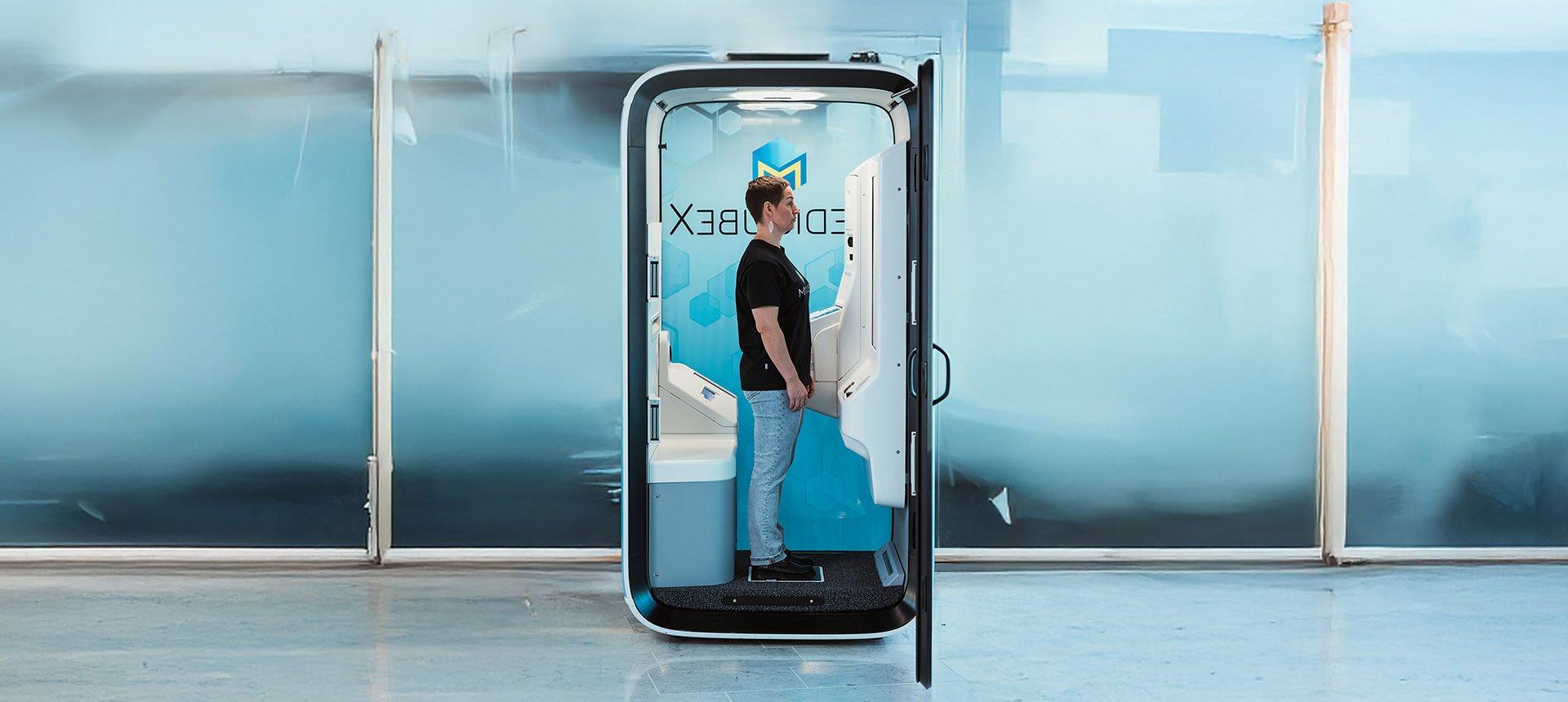
MedicubeX for
HEALTHCARE

Acute & Emergency
Place the eHealth Station in your emergency department waiting area to automate patient intake. The Station provides triage nurses with standardized vitals before the first clinical contact, helping to identify high-priority patients faster, shorten queues, and save 8-15 minutes of staff time per patient.
1. Check-in
Patients identify themselves and check in using a strong authentication method.
2. Medicube X®
eHealth Station™
Patient answer questions and measures their vital sign in 5 min without assistance
3. Triage
• The most acute patients are identified immediately
• Possibility of referring the patient home or or to nonurgent care
4. More diagnostics if needed*
• X-rays
• Ultrasound
• CT, MRI
• Laboratory tests
5. Appointment with doctor
• Treatment plan
• Referrals to further treatment, diagnostics test or home
Benefits
✅ Faster & More Accurate Triage
The eHealth Station allows you to immediately identify and prioritize the most critical patients from the moment they arrive. Its automated screening flags abnormal results instantly, ensuring those with potential cardiac events, hypoxia, or severe hypertension are not left waiting. This is made possible by providing triage nurses with a complete set of standardized vital signs before the first clinical contact, enabling faster, more accurate, and data-driven triage decisions.
✅ Improved Workflow Efficiency & Shorter Wait Times
By automating the routine collection of vital signs and patient questionnaires, the Station streamlines patient intake, accelerates triage, and saves 8-15 minutes per patient. This reduces queues, alleviates administrative burden, and allows clinical teams to focus on high-value patient care. Faster initial assessments lead to shorter overall wait times and a more efficient patient journey from arrival to treatment.


Non-Urgent & Ambulatory Care
Streamline every scheduled appointment and enhance the quality of chronic care management. The eHealth Station prepares both the patient and the clinician for a more productive and data-driven consultation.
Examples
Pre-Appointment Screening: Patients complete a full vital signs check-up and relevant questionnaires before their consultation. This ensures the clinician has a complete, up-to-date health profile the moment the appointment begins.
Chronic Disease Follow-ups: The station provides a standardized method for consistent monitoring of conditions like hypertension or diabetes, helping to track progress and improve treatment adherence between visits.
Benefits
✅ More Productive Consultations: Clinicians can focus entirely on treatment and conversation, as routine data collection is already complete.
✅ Increased Staff Efficiency: Frees up nurses and doctors from manual vital sign collection and data entry, allowing them to perform higher-value tasks.
✅ Improved Patient Outcomes: Consistent, high-quality data leads to better-informed clinical decisions and more effective management of chronic conditions.
✅ Enhanced Patient Engagement: Involves patients directly in their own care, empowering them to track their progress and supporting positive lifestyle changes.


Prevention & Population Health
The MedicubeX eHealth Station redefines preventive care by shifting healthcare from reactive treatment to proactive management. It serves as an accessible platform for implementing both individual patient check-ups and large-scale population health initiatives.
General Health Check-ups: Offer an accessible, on-demand option for patients and the public to monitor their health proactively. This empowers individuals to take an active role in their own well-being and enables the early detection of potential health risks before they become serious.
Targeted Screening Programs: Deploy the Station for specific public health initiatives, such as cardiovascular health campaigns or diabetes risk assessments. The platform allows you to efficiently screen large groups, identify at-risk individuals, and gather valuable data for population health management.
Clinical Research: Utilize the Station to collect high-quality, standardized data from participants in a consistent and efficient manner. The automated process reduces manual errors and streamlines data collection, making it an invaluable tool for a wide range of clinical studies and trials.
Telehealth
Medicube X® eHealth Stations™ are equipped with 32” screens and high quality video and audio equipment for remote appointments. The Stations can be located anywhere as they do not require daily maintenance.
Benefits
Early Detection of Disease
Patient Empowerment
Valuable Population Health Data
Streamlined Research

“We revolutionize healthcare, enabling efficient access to vital sign measurements and immediate remotecare services”

Why are these measurements important?
-
Helps in the assessment of: strokes, heart attacks, vertigo etc.
-
Helps in the assessment of: arrhythmias, heart attacks, pulmonary embolisms, pneumonia etc.
-
Helps in the assessment of: COPD, pulmonary embolisms, pneumonia, asthma etc.
-
Helps in the assessment of: COPD, pulmonary embolisms, pneumonia, asthma etc.
-
Helps in the assessment of: level of bacterial or viral infection, autoimmune disease, malignancies etc.
-
Overweight and obesity → increases the risk of developing conditions such as type 2 diabetes, cardiovascular diseases, sleep apnea, osteoarthritis, and certain cancers.
Underweight → can indicate malnutrition, eating disorders, chronic diseases (e.g., cancer, lung diseases), hyperthyroidism, or other metabolic disorders.
Rapid weight changes → can indicate changes in fluid balance, for example, from conditions such as heart failure, kidney failure, or liver diseases.
Weight monitoring → helps to assess the effectiveness of lifestyle interventions, medication, or treatment programs (e.g., for patients with diabetes or heart conditions).
-
Helps in the assessment of: arrhythmias, such as atrial fibrillation, long QT, AV-blocks, screening of changes in ECG (Q-wave, U-wave, Bundle branch block, AV-Block) etc.
-
Helps in the assessment of: risk of strokes or heart attacks, risk of type 2 diabetes and it’s complications
-
This helps to assess the risk of type 2 diabetes and its complications, as well as the need for lifestyle interventions. The Basal Metabolic Rate (BMR) is used to evaluate the balance between energy intake and expenditure, which is essential for planning effective weight management and lifestyle strategies.











